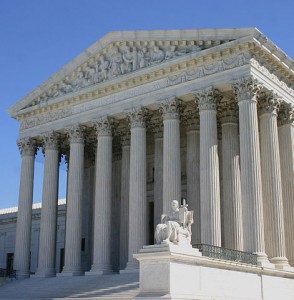WASHINGTON, D.C.—While two hours of arguments on the individual mandate provision of the 2010 Patient Protection and Affordable Care Act have given no apparent indication how several of the Supreme Court justices might rule on the constitutionality of the mandate, what is apparent is the level of skepticism shown by the conservative members of the Court.
 Suggesting that the 2010 Patient Protection and Affordable Care Act invoked a power “beyond what our cases” have indicated Congress possesses to regulate interstate commerce, Justice Anthony M. Kennedy asked government lawyers, “Can you create commerce in order to regulate it?”
Suggesting that the 2010 Patient Protection and Affordable Care Act invoked a power “beyond what our cases” have indicated Congress possesses to regulate interstate commerce, Justice Anthony M. Kennedy asked government lawyers, “Can you create commerce in order to regulate it?”
Passed by a Democrat Congress in 2010, President Obama’s signature legislation overhauls the way Americans conduct business in regard to their health care options and gives the government authority over not only health care choices for individuals, but authority over one-sixth of the American economy.
Justice Antonin Scalia questioned U.S. Solicitor General Donald B. Verrilli, Jr. about the government’s position. “So, if I’m in any market at all, my failure to purchase subjects me to regulation?”
While Virrelli repeated the government’s contention that the health-care market was unique because no one can predict what services they will need and when, several of the justices refused to bite. Justice Samuel Alito called the government’s underlying logic “artificial” and compared it to the issue of burial services, a service everyone will eventually partake of. The government makes no mandate there, yet under the government’s reasoning, could actually do so.
Therein lies the crux of the matter, as several justices noted. Since cell phones would assist the government’s system for providing fire and ambulances services in emergencies, should everyone be compelled to buy one, asked Chief Justice John. G. Roberts.
However, Justice Ruth Bader Ginsberg noted that “the people who don’t participate in this market are making it much more expensive for those that do.” Justice Scalia retorted, “You could say that about buying a car. If people don’t buy a car, the price [that car buyers] will pay will be more.”
The National Federation of Independent Businesses is one of the opponents before the court, along with 26 states. They say that people who don’t buy insurance are, by definition, not engaged in an economic activity and there is no precedent that empowers Congress to compel inactive people into a market that it can regulate.
As Justice Scalia said today, “Government is supposed to be a government of limited powers. What is left if the government can do this? What can it not do?”
Since the Patient Protection and Affordable Care Act was signed into law, President Obama and his administration has argued that Congress has the authority to impose the individual mandate under its power to regulate interstate commerce. The act requires that Americans have health insurance by 2014 or begin paying fines and penalties on their 2015 tax returns.
 Off The Grid News Better Ideas For Off The Grid Living
Off The Grid News Better Ideas For Off The Grid Living



